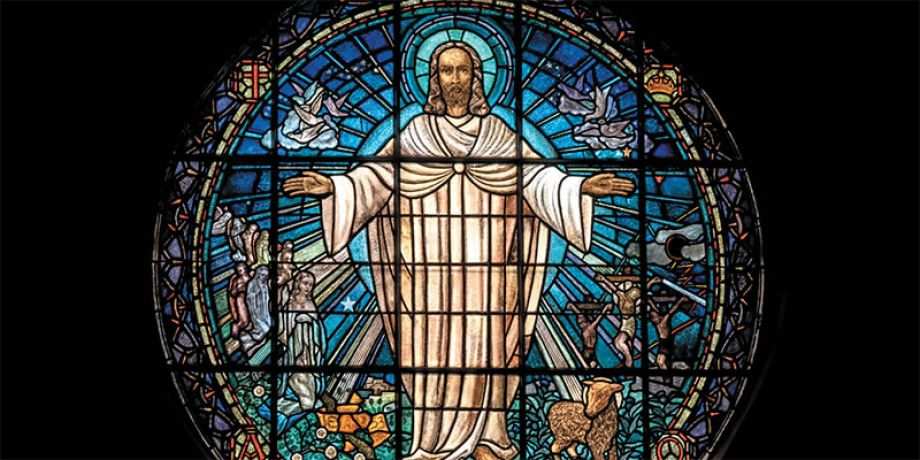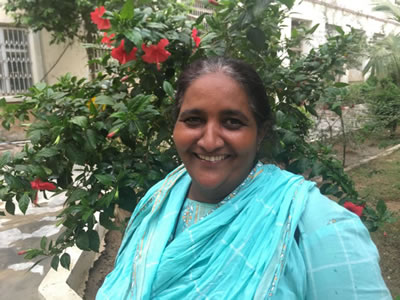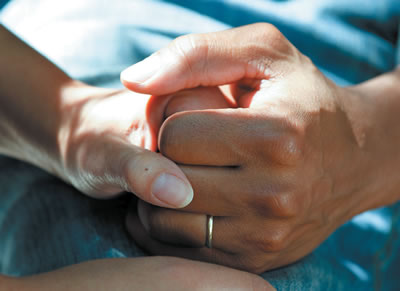
I met Loweza in the village named Mundiala Virka many years ago when I was on mission in Sheikhupura Parish in Punjab Province, Pakistan. She arrived at their simple village home carrying a heavy load of green fodder for their few buffaloes, goats and sheep. Loweza, like the majority of the girls in her village did not attend school. She worked as a young shepherdess. “Early in the morning I milked the buffalo and then took out the sheep and goats for grazing. I would then return with them before the sun set. I enjoyed this life very much, with the freedom of roaming here and there with the animals, finding grass and branches of trees for them to eat near the canal and country tracks. Some of the goats and sheep belonged to a blind couple whom I also cared for.”

When I went to the village for visitation and Mass, I was very impressed with Loweza’s proactive presence. She had learned much from the example of her elder sister who sadly had died as a young woman. Loweza, with the help of the children, had put another layer of soil on the church’s floor as well as cleaned the church and small compound. Then she would, with loud joyful voice, do the rounds of the Christian families and call them to come to the church. She would also, at harvest time, gather a share of the wheat and rice harvest from the families as their contribution to the parish.
I also noted her as a girl bargaining with the Tonga Wallas, (horse and cart taxis), about a just fare in traveling to her village. Seeing all of this behavior from a girl in a male dominated society inspired me.
When I went to the village for visitation and Mass, I was very impressed with Loweza’s proactive presence. She had learned much from the example of her elder sister who sadly had died as a young woman.
Some Mercy Sisters from Australia had recently opened a hostel for girls whose situation was similar to Loweza, in that they have not attended school. It was a place where they could learn to read and write as well as receive much formation in faith and life skills. Loweza said, “It was a big change in life style for me. The Sisters frowned on us eating food with our hands. There was much new discipline which we were not aware of. Sister would tell us to say “sorry” but I did not know the meaning of the word, and I felt that I had done nothing wrong. Overall, I enjoyed the life there with the friends I made, as well as that I learnt so much from the Sisters, which has been a great help throughout my life.”
The Sisters found Loweza to be an exceptional young woman and asked me to send her back for another year. On returning home to her village Loweza also became an active member of the parish womens’ group which was facilitated by a former Columban lay missionary, Gloria Canama who had served on mission in Pakistan from 1990-2013. Over these years Loweza graduated as a “village Bible leader” and also went on a mission exchange program to the Columban mission in Sindh Province.
Over this time Loweza’s family were making plans to find a suitable man so that Loweza could be married as she was about 18 years old. “My heart tells me that I do not want to be married,” she stated. Her mother, Bashiran said to me. “What to do, Loweza is refusing to be married and so now Fr. Dan she is your responsibility.”
 I had heard of a girls’ hostel and school in Karachi which was run by a Sister Janine. Karachi is about a 20-hour train journey from Lahore. Loweza made this journey by herself to check it out and on her return stated to me. “I will go and live in Karachi. The hostel and school is good. The arrangement is that the girls work in the mornings to cover some of the costs of the food and education, and then attend school in the afternoons.”
I had heard of a girls’ hostel and school in Karachi which was run by a Sister Janine. Karachi is about a 20-hour train journey from Lahore. Loweza made this journey by herself to check it out and on her return stated to me. “I will go and live in Karachi. The hostel and school is good. The arrangement is that the girls work in the mornings to cover some of the costs of the food and education, and then attend school in the afternoons.”
At a later date when I visited her I was impressed with the rapport that she had with the leprosy patients that she was caring for and the happiness that she brought to their lives. Loweza told me that, “A Muslim woman, named Zakia, was stricken by this terrible disease. She had lost her feet and hands and had little sight left in her eyes. People had fear seeing her situation and did not want to care for her. I was able to bathe her and dress her wounds.” There was some anxiety when some black spots appeared on Loweza’s body. She was then taken off this work and treated. Thank God that it was not leprosy, and the black spots went away. “When I started attending the school I felt some embarrassment as I had to sit in the class with the young girls,” she told me.
Over many years Loweza has journeyed with the sick and poor who require medical care. She cares for and facilitates many Tribal people from Interior Sindh that Columbans send to her. Life in the big city of Karachi with its 20 million plus population is so very different to life in their villages. Loweza has many contacts in the hospitals with doctors and nurses who have great admiration and respect for her. She is able to obtain medical care for operations and medical needs as well as obtaining discounts for medicines, blood, etc. These poor patients, Christians, Muslims and Hindus would be at a loss without the competent and compassionate care of Loweza.
Columban Fr. Dan O’Connor lives and works in Pakistan.